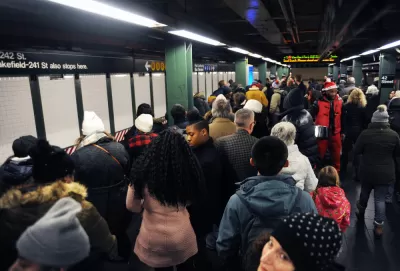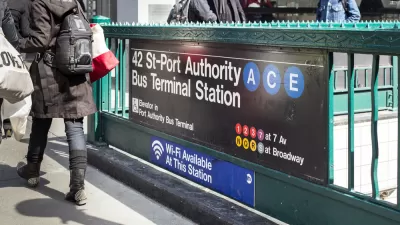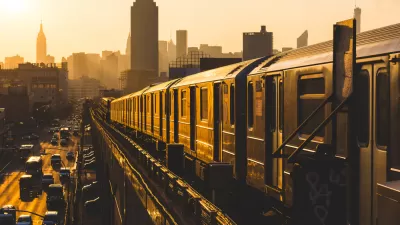With ridership still at less than half of pre-pandemic levels, the region's transit agencies face billions of dollars in budget shortfalls after federal assistance runs out.

Without the crush of pre-pandemic commuters, write Elise Young and Raeedah Wahid, New York City's public transit providers, who "rely heavily on fare revenue for day-to-day expenses," will have to make massive cuts in staff and service after federal pandemic relief dollars run out. With less than half of its typical ridership, New York's Metropolitan Transportation Authority faces a shortfall of billions of dollars.
"The non-profit Regional Plan Association, which researches New York City-area economic and environmental issues, predicts an eventual ridership recovery. But some commuters will trade the 9-to-5 workday for more flexible hours, driving up off-peak travel -- and potentially creating chaos, according to Tom Wright, the association’s president." Off-peak travel, says Wright, "actually puts more pressure on the transit agencies."
According to Redfin, "[r]eal estate in popular New York City suburban commuter hubs continued to soar during the pandemic, but the hotter single-family home market is in areas with little to no mass transit." Workers who are making their return to the city "are finding increased crime rates and vacancies among office towers’ street-level businesses that once teemed with commuters," evidence of the trickle-down effects of reduced workforces in central business districts, whose corporate offices created the need for a wide variety of ancillary services. If, as Richard Florida predicts, central business districts will transform into multi-purpose hubs and "15-minute neighborhoods" less dependent on daily commuters, transit agencies may once again need to readjust their service to cater to new needs and schedules.
FULL STORY: NYC Needs the Commuting Crowds That Have Yet to Fully Return

Planetizen Federal Action Tracker
A weekly monitor of how Trump’s orders and actions are impacting planners and planning in America.

Chicago’s Ghost Rails
Just beneath the surface of the modern city lie the remnants of its expansive early 20th-century streetcar system.

San Antonio and Austin are Fusing Into one Massive Megaregion
The region spanning the two central Texas cities is growing fast, posing challenges for local infrastructure and water supplies.

Since Zion's Shuttles Went Electric “The Smog is Gone”
Visitors to Zion National Park can enjoy the canyon via the nation’s first fully electric park shuttle system.

Trump Distributing DOT Safety Funds at 1/10 Rate of Biden
Funds for Safe Streets and other transportation safety and equity programs are being held up by administrative reviews and conflicts with the Trump administration’s priorities.

German Cities Subsidize Taxis for Women Amid Wave of Violence
Free or low-cost taxi rides can help women navigate cities more safely, but critics say the programs don't address the root causes of violence against women.
Urban Design for Planners 1: Software Tools
This six-course series explores essential urban design concepts using open source software and equips planners with the tools they need to participate fully in the urban design process.
Planning for Universal Design
Learn the tools for implementing Universal Design in planning regulations.
planning NEXT
Appalachian Highlands Housing Partners
Mpact (founded as Rail~Volution)
City of Camden Redevelopment Agency
City of Astoria
City of Portland
City of Laramie





























